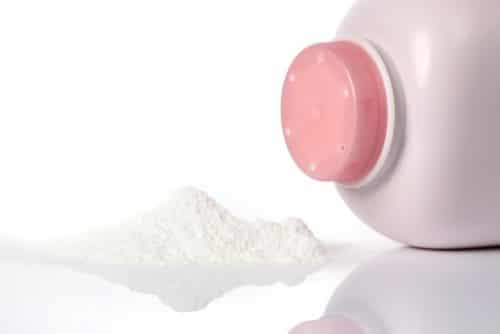A 2016 jury verdict shows that this product may cause cancer.

Throughout the years, many Americans have likely used talcum powder for one reason or another — to prevent diaper rash, for personal hygiene, or even to freshen up our shoes. Often called baby powder, this product seems like it should be harmless — but last year, a jury awarded the family of a woman who developed cancer from it $72 million dollars in damages. Just two months later, a different jury awarded a woman 55 million dollars for the injuries she suffered after getting cancer from using the same product.
Jacqueline Fox filed a lawsuit against Johnson & Johnson, the brand of talcum powder preferred by Ms. Fox. She used the product daily for feminine hygiene for more than 25 years. After being diagnosed with ovarian cancer, she filed a lawsuit against Johnson & Johnson. Ms. Fox died just a few months before the case went to trial, and her family carried on the lawsuit. Similarly, Gloria Ristesund won her lawsuit against Johnson & Johnson after she was diagnosed with ovarian cancer. She had also used the talcum powder for more than thirty years.
Failure to Warn
These two cases share a common theory: that Johnson & Johnson was liable for their cancer because it knew about the link between talcum powder use and cancer. Because the company failed to warn customers of the potential for getting ovarian cancer if the powder is used for feminine hygiene purposes, they argued that it should be held legally responsible for their injuries. Two separate juries agreed with the allegations in these cases, awarding the plaintiffs both compensatory damages (meant to compensate a victim and/or her family for their losses) and punitive damages (meant to punish the defendant for wrongdoing). In both cases, the award was largely for punitive damages — $62 million in the Fox case and $50 million in the Ristesund case. Punitive damages are rarely awarded, but were apparently justified in this case because of the company’s actions.
Failure to warn is a type of claim made in a product liability case where someone is harmed because a company failed to warn them that a particular use of their product was unsafe. This use must be something known or anticipated by the company, such as women using baby powder as a feminine hygiene product. If a company knows that a particular use is likely and that a person could be harmed by that use, it can be held responsible under this theory.
These types of cases can come up in any number of ways. A manufacturer of a cleaning product could be sued for failing to warn customers that if the product is mixed with another cleaning product, dangerous fumes could result. A ladder company could be sued for not warning customers to not step on the top rung. A pharmaceutical corporation could find itself facing lawsuits if it knew that use of its drug by certain people could result in harm, yet it failed to include that as a warning.
In the United States, the Food and Drug Administration (FDA) has not declared talcum powder to be a carcinogen, although it has been banned as a personal care product by the European Union. However, despite the fact that talcum powder has not been deemed a dangerous product by the FDA, the lawyers for the above-described cases were able to prove that (1) the powder causes ovarian cancer when used as a feminine hygiene product; (2) Johnson and Johnson was aware that its product could cause cancer when used in this way; (3) Johnson & Johnson knew that consumers used talcum powder for feminine hygiene; and (4) the company failed to warn consumers that using talcum powder in this way could lead to cancer. On this basis, the juries found that the company should be held responsible for the injuries that it caused.
If you have been injured by a dangerous or defective product, there is help. Contact the Law Offices of Larry H. Parker today at 800-333-0000 or info@larryhparker.com. We have assisted more than 100,000 clients obtain over $2 billion dollars for their injures. Initial consultations are always free, and we never charge a fee unless we recover money for you!



